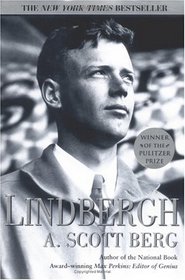Helpful Score: 2
A great biography that shows Lindbergh as (mostly) was--a Nazi-sympathizing, disturbingly likable pilot worshiped as a god for flying across the ocean.
My only complaint is that this was written before DNA tests proved he was a bigamist with a secret family living in Germany--I can't believe A.Scott Berg hasn't issued a revised edition incorporating that new information yet!
My only complaint is that this was written before DNA tests proved he was a bigamist with a secret family living in Germany--I can't believe A.Scott Berg hasn't issued a revised edition incorporating that new information yet!
Helpful Score: 2
Lindbergh, by A. Scott Berg, is the only "official" biography of Charles Lindbergh. Anne Morrow Lindbergh had hired Berg, prior to her death, giving him access to records involving CAL's history, with the stipulation that the biography not be compiled or written until after AML's death.
I have been intrigued by CAL's life for many years. I read Anne Morrow Lindbergh's memoir, "Send me a Unicorn", and that got me hooked on this fascinating couple. However, after several attempts, I could not bring myself to finish this dry biography of what was a very interesting, and multidimensional life story.
Since reading the first third of this book, I have since learned that it actually misses out on a lot of CAL's life. For instance, he actually had families with two separate German women. Lindbergh's daugher, Reeve, writes about meeting her half-siblings and how it felt to learn of her father's infidelity.
I think, though, what I missed most, compared to the Diary/Letters of "Bring Me a Unicorn", and the following collections, "War Within and Without", "The Flower and the Nettle", is that *Lindbergh* essentially lacks a human voice, the voice of CAL, himself. Berg tries so hard to be dispassionate about his subject, that his writing lacks any passion at all. You could probably get a lot of "hard" data out of this biography. Things like dates, and such. But I didn't find much insight into what made Lindbergh a great, and yes, a puzzle of a man.
I have been intrigued by CAL's life for many years. I read Anne Morrow Lindbergh's memoir, "Send me a Unicorn", and that got me hooked on this fascinating couple. However, after several attempts, I could not bring myself to finish this dry biography of what was a very interesting, and multidimensional life story.
Since reading the first third of this book, I have since learned that it actually misses out on a lot of CAL's life. For instance, he actually had families with two separate German women. Lindbergh's daugher, Reeve, writes about meeting her half-siblings and how it felt to learn of her father's infidelity.
I think, though, what I missed most, compared to the Diary/Letters of "Bring Me a Unicorn", and the following collections, "War Within and Without", "The Flower and the Nettle", is that *Lindbergh* essentially lacks a human voice, the voice of CAL, himself. Berg tries so hard to be dispassionate about his subject, that his writing lacks any passion at all. You could probably get a lot of "hard" data out of this biography. Things like dates, and such. But I didn't find much insight into what made Lindbergh a great, and yes, a puzzle of a man.
Helpful Score: 1
Charles Lindbergh's solo flight from New York to Paris captured the imagination of a postwar generation hungry for heroes, and cemented an exalted spot for the 25-year-old pilot from Minnesota in the collective American imagination. A. Scott Berg's thorough new biography of the aviator suggests that despite the public scrutiny that accompanied his every move until his death in 1974, Lindbergh remained an intensely private man. The son of ill-matched parents who separated when he was 6, he was painfully shy and emotionally guarded. "Aviation created a brotherhood of casual acquaintances ... in which he felt comfortable," writes Berg with characteristic perceptiveness.
Lindbergh's wife, the writer Anne Morrow Lindbergh, gave Berg unrestricted access to her husband's and her own voluminous personal papers--and he made good use of them to assess both the couple's relationship and their activities. Probably the most startling revelation is a brief but candid discussion of Anne's affair in the late 1950s with a New Jersey doctor, which helped assuage her need to vent emotions in a way her buttoned-up husband found insupportable. (During the horrendous days in 1932 when their 20-month-old son was kidnapped and killed, Berg notes, she never once saw Charles cry.) The biography is solid on all aspects of Lindbergh's career, including his notorious urging that America stay out of World War II; Berg rebuts charges that Lindbergh was a Nazi or a traitor, but rightly criticizes the anti-Semitism latent in some of his speeches. With this book, Berg succeeds in surveying Lindbergh's fascinating life and assessing its historic impact.
Lindbergh's wife, the writer Anne Morrow Lindbergh, gave Berg unrestricted access to her husband's and her own voluminous personal papers--and he made good use of them to assess both the couple's relationship and their activities. Probably the most startling revelation is a brief but candid discussion of Anne's affair in the late 1950s with a New Jersey doctor, which helped assuage her need to vent emotions in a way her buttoned-up husband found insupportable. (During the horrendous days in 1932 when their 20-month-old son was kidnapped and killed, Berg notes, she never once saw Charles cry.) The biography is solid on all aspects of Lindbergh's career, including his notorious urging that America stay out of World War II; Berg rebuts charges that Lindbergh was a Nazi or a traitor, but rightly criticizes the anti-Semitism latent in some of his speeches. With this book, Berg succeeds in surveying Lindbergh's fascinating life and assessing its historic impact.




![header=[] body=[Get a free book credit right now by joining the club and listing 5 books you have and are willing to share with other members!] Help icon](/images/question.gif?v=5fea88b8)
